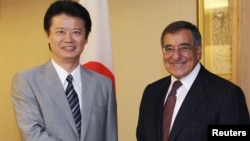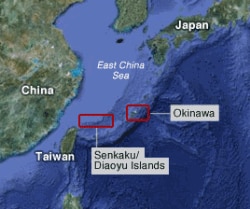TOKYO —
As anti-Japan protests continued since last week in China, officials in Tokyo told the visiting U.S. defense secretary they are attempting to prevent ties with Beijing over disputed islands from further fraying.
Before flying to Beijing, U.S. Defense Secretary Leon Panetta met with the Japanese foreign and defense ministers.
Foreign Minister Koichiro Genba told Panetta the Japanese government is trying to prevent the dispute over a set of small, uninhabited islands from spinning out of control.
Genba says Japan desires to cooperate with the United States to ensure relations between Tokyo and Beijing will not be seriously harmed.
Panetta, alongside his Japanese counterpart, Defense Minister Satoshi Morimoto, reiterated Washington's stance that while it does not take sides in Japan's territorial disputes with its neighbors, the United States will abide by its treaty agreements to come to Japan's aid if it is attacked. But he made it clear he hopes it never comes to that.
“It is in everybody's interest for Japan and China to maintain good relations and to avoid further escalation,” Panetta said.
Violent anti-Japanese protests about the barren islands known as Senkaku in Japanese and Diaoyu in Chinese, have erupted in recent days throughout China.
Japan's embassy in Beijing has been the scene of boisterous demonstrations, and Japanese factories, restaurants and shops in several cities have been attacked.
Japanese electronics company Panasonic says it has suspended operations at three of its factories in China after protesters damaged two of the plants Saturday.
In Beijing Monday, Foreign Ministry spokesman Hong Lei called on Chinese citizens to express themselves lawfully, but also said that Japan must account for its actions.
He says at the moment the crucial point is that Japan has to face China’s serious requests. He says the Chinese people have justly called for a correct and responsible attitude in coming back to the negotiation table to solve the Diaoyu islands dispute.
In Tokyo, the two defense chiefs agreed Monday to move ahead with placing a second sophisticated radar installation at an undetermined site in southern Japan primarily intended to defend against future ballistic missile launches by North Korea.
U.S. defense officials deny the new radar facility is also directed against China.
The Japanese and American defense chiefs also announced the two countries are close to concluding a safety review that would clear 12 of the controversial Osprey tilt-wing rotor aircraft to operate from a U.S. Marine base on Okinawa.
Some civic groups on Okinawa strongly oppose the deployment of the V-22s, saying they are dangerous and the southern islands already bear too much of the burden of hosting U.S. forces and aircraft.
But other Japanese say the country has no choice, amid a more assertive China, to continue to heavily rely on the U.S. military.
Under the constitution imposed on a defeated Japan after the second world war, the country is prohibited from having an offensive military force. And Japan limits defense spending to one percent of its GDP.
However, in China, the view of Japan these days is not that of a pacifist neighbor.
Chinese, who suffered under a harsh Japanese colonization in the early 20th century, see Tokyo's recent move to nationalize disputed islands as a serious provocation.
The territory is known as Diaoyu in Chinese and Senkaku in Japanese.
Violent anti-Japanese protests about the barren islands have erupted in recent days throughout China. Japan's embassy in Beijing has been the scene of boisterous demonstrations, and Japanese factories, restaurants and shops in several cities have been attacked.
Before flying to Beijing, U.S. Defense Secretary Leon Panetta met with the Japanese foreign and defense ministers.
Foreign Minister Koichiro Genba told Panetta the Japanese government is trying to prevent the dispute over a set of small, uninhabited islands from spinning out of control.
Genba says Japan desires to cooperate with the United States to ensure relations between Tokyo and Beijing will not be seriously harmed.
Panetta, alongside his Japanese counterpart, Defense Minister Satoshi Morimoto, reiterated Washington's stance that while it does not take sides in Japan's territorial disputes with its neighbors, the United States will abide by its treaty agreements to come to Japan's aid if it is attacked. But he made it clear he hopes it never comes to that.
“It is in everybody's interest for Japan and China to maintain good relations and to avoid further escalation,” Panetta said.
Violent anti-Japanese protests about the barren islands known as Senkaku in Japanese and Diaoyu in Chinese, have erupted in recent days throughout China.
Japan's embassy in Beijing has been the scene of boisterous demonstrations, and Japanese factories, restaurants and shops in several cities have been attacked.
Japanese electronics company Panasonic says it has suspended operations at three of its factories in China after protesters damaged two of the plants Saturday.
In Beijing Monday, Foreign Ministry spokesman Hong Lei called on Chinese citizens to express themselves lawfully, but also said that Japan must account for its actions.
He says at the moment the crucial point is that Japan has to face China’s serious requests. He says the Chinese people have justly called for a correct and responsible attitude in coming back to the negotiation table to solve the Diaoyu islands dispute.
In Tokyo, the two defense chiefs agreed Monday to move ahead with placing a second sophisticated radar installation at an undetermined site in southern Japan primarily intended to defend against future ballistic missile launches by North Korea.
U.S. defense officials deny the new radar facility is also directed against China.
The Japanese and American defense chiefs also announced the two countries are close to concluding a safety review that would clear 12 of the controversial Osprey tilt-wing rotor aircraft to operate from a U.S. Marine base on Okinawa.
Some civic groups on Okinawa strongly oppose the deployment of the V-22s, saying they are dangerous and the southern islands already bear too much of the burden of hosting U.S. forces and aircraft.
But other Japanese say the country has no choice, amid a more assertive China, to continue to heavily rely on the U.S. military.
Under the constitution imposed on a defeated Japan after the second world war, the country is prohibited from having an offensive military force. And Japan limits defense spending to one percent of its GDP.
However, in China, the view of Japan these days is not that of a pacifist neighbor.
Chinese, who suffered under a harsh Japanese colonization in the early 20th century, see Tokyo's recent move to nationalize disputed islands as a serious provocation.
The territory is known as Diaoyu in Chinese and Senkaku in Japanese.
Violent anti-Japanese protests about the barren islands have erupted in recent days throughout China. Japan's embassy in Beijing has been the scene of boisterous demonstrations, and Japanese factories, restaurants and shops in several cities have been attacked.










